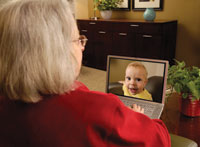Helping Seniors Get Hooked on the Internet
By Lisa C. Bailey
 In our hyper-linked world, there are still pockets of isolation cut off from the benefits of the Internet. But unlike some other groups who are underrepresented online—minorities and the economically disadvantaged, for example—many older adults seem to remain unplugged on purpose.
In our hyper-linked world, there are still pockets of isolation cut off from the benefits of the Internet. But unlike some other groups who are underrepresented online—minorities and the economically disadvantaged, for example—many older adults seem to remain unplugged on purpose.
That could be an unhealthy choice. The Internet is an invaluable resource for help in making key life decisions and tapping into expert knowledge, says UAB sociologist Shelia Cotten, Ph.D. It is also a great way for people “to connect with others that they can’t see regularly or easily,” she notes. And this is particularly true for older adults, because “many suffer from health impairments and mobility issues that prevent them from traveling.”
Long-Distance Relationships
Cotten became interested in the social benefits of computers when she moved to Boston in 1998 for a postdoctoral fellowship, leaving friends and family behind. “I began to think about how I was communicating with members of my social networks—which was primarily through the Internet via e-mail—and I realized that few researchers were examining how online communication affects social support and well-being,” she says.
One of the key questions is why more older adults don’t head online. Fear of scams and of computers themselves are big factors, but Cotten’s research suggests that the main reason may be that older adults just don’t see the relevance of the Internet to their lives.
In a recent survey, Cotten and her graduate students assessed computer and Internet use among adults age 50 and older in the greater Birmingham area. Approximately 61 percent of respondents reported owning computers, and 60 percent said they used them. Forty-eight percent of those who used the Internet said they went online daily. While 16 percent of respondents were concerned that the Web was too hard to use, and 23 percent were afraid of online scams, the highest number—27 percent—reported that they simply didn’t want to use the Internet.
“The biggest barrier to getting older adults online is helping them realize how computers and the Internet can be useful to them in their daily lives,” says Cotten. “If you can help people see how they can be useful and help them acquire the skills to do what they need to do online, they can overcome their fears.”
Tech Support
Cotten is pursuing a grant from the National Institutes of Health that will allow her to bring practical advice and technical training to older adults in 15 assisted-living facilities in the Birmingham area.
The six-week training program will begin with a discussion of reasons for using computers and the Internet. Starting from the most basic of basics—how to turn on the computer—the training will progress to sessions on sending digital pictures by e-mail, making online purchases, and avoiding scams. “We also plan to have an ‘in-house’ assisted-living resident who is skilled with using computers and the Internet that participants can contact if they have questions,” Cotten says.
The benefits of this training should be wide-ranging, she adds. Reestablishing connections to distant friends and family helps older adults “feel that they matter to others.” And many years of experience interviewing older adults have taught Cotten how much this age group enjoys having the chance to tell its own stories. “I think there is a great opportunity to use the Internet to help older adults enhance their quality of life and pass along their history to future generations.”